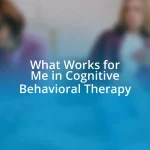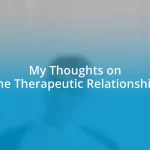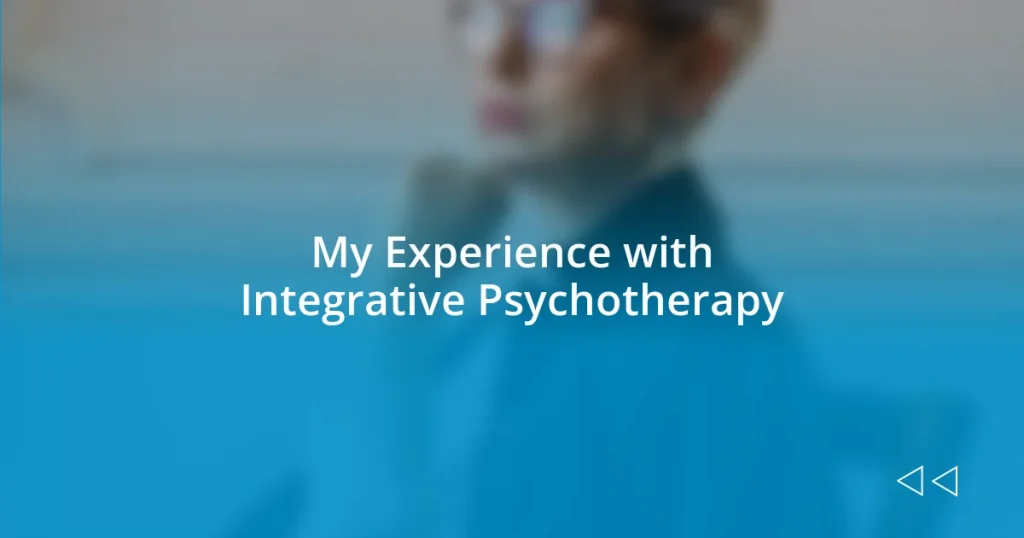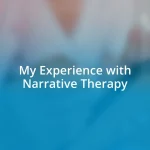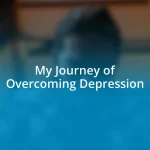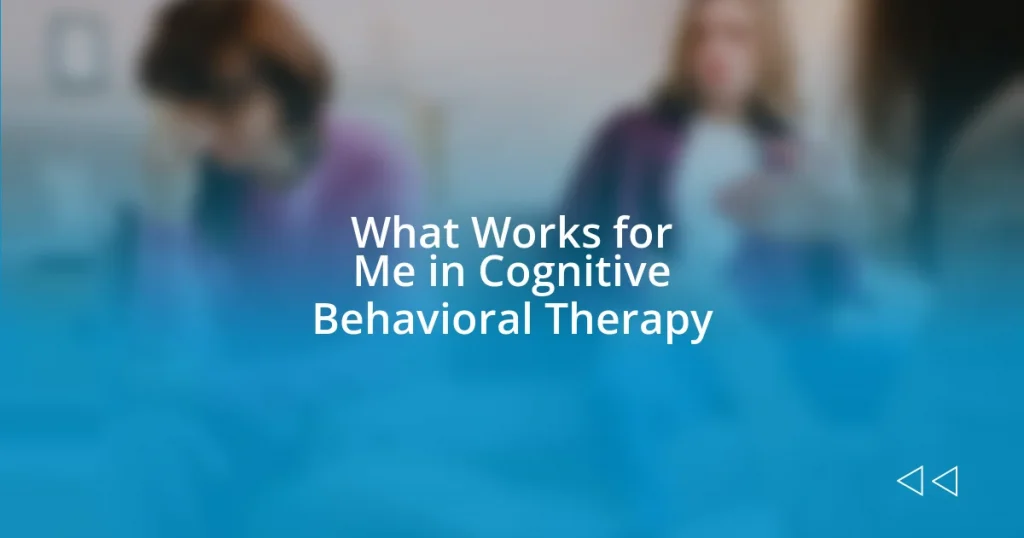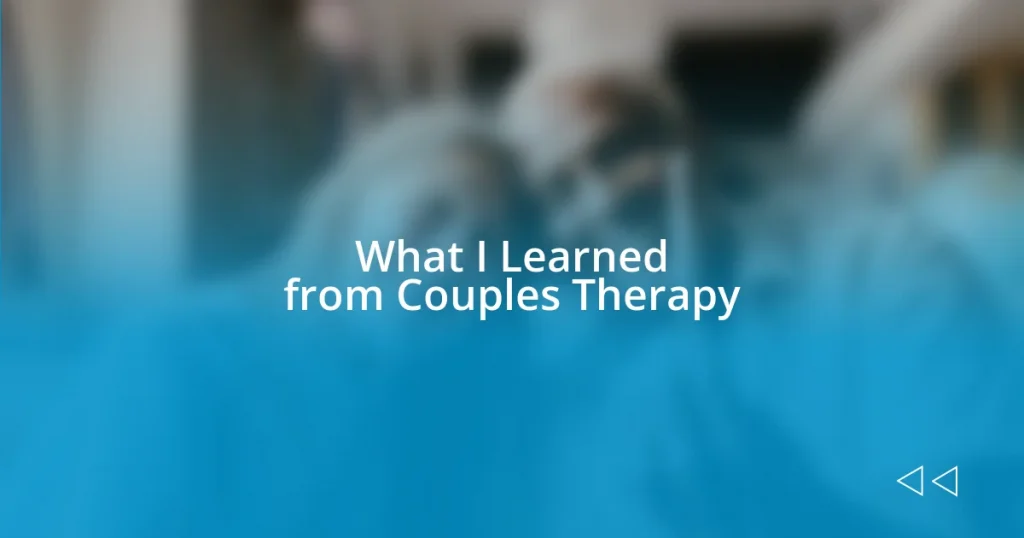Key takeaways:
- Integrative psychotherapy offers a holistic approach, focusing on the individual as a whole rather than just symptoms, fostering a sense of understanding and partnership during the therapeutic process.
- The flexibility of methods, such as mindfulness and cognitive restructuring, allows for personalized treatment that cultivates emotional resilience and addresses multiple issues simultaneously.
- Transformative outcomes include emotional awareness and clearing long-standing beliefs, enabling individuals to build healthier relationships and gain clarity about their triggers linked to past experiences.
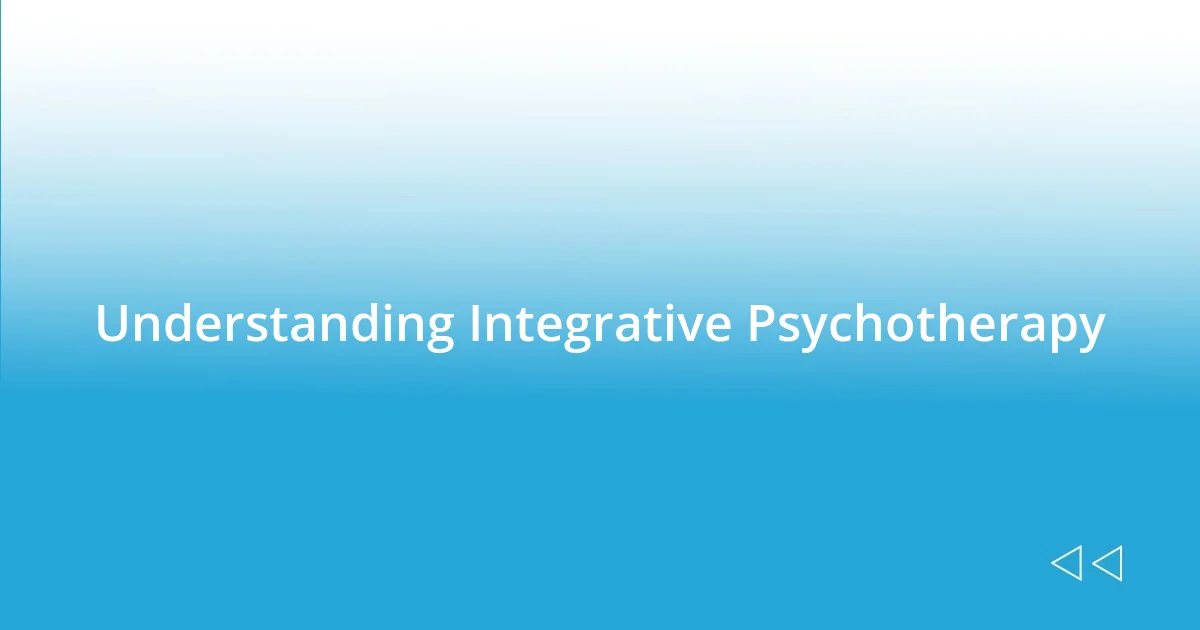
Understanding Integrative Psychotherapy
Integrative psychotherapy is a holistic approach that combines various therapeutic techniques and principles tailored to the individual’s unique needs. In my experience, this adaptability made me feel heard and understood, as the therapist would seamlessly draw from different schools of thought—be it cognitive-behavioral strategies or psychodynamic insights. It’s like having a toolbox where the therapist picks the right tool for each situation, which can be truly comforting.
What stands out to me about integrative psychotherapy is its focus on the whole person, rather than just symptoms. I remember a session when we shifted from discussing my anxiety to exploring my childhood experiences. It struck me how interconnected our emotional patterns can be. Has anyone else felt that sudden realization when diving deep into their past brings clarity to their present? I certainly did, and it felt like a weight had been lifted.
Moreover, I found that the collaborative nature of integrative psychotherapy fosters a safe environment for exploration. Working together with my therapist, we navigated my thoughts and feelings, creating an atmosphere where vulnerability was not just allowed but encouraged. This genuine partnership made each breakthrough feel like a shared victory, which is incredibly empowering. How often do we really get that kind of support in our daily lives? That sense of being truly understood is a powerful part of the healing journey.
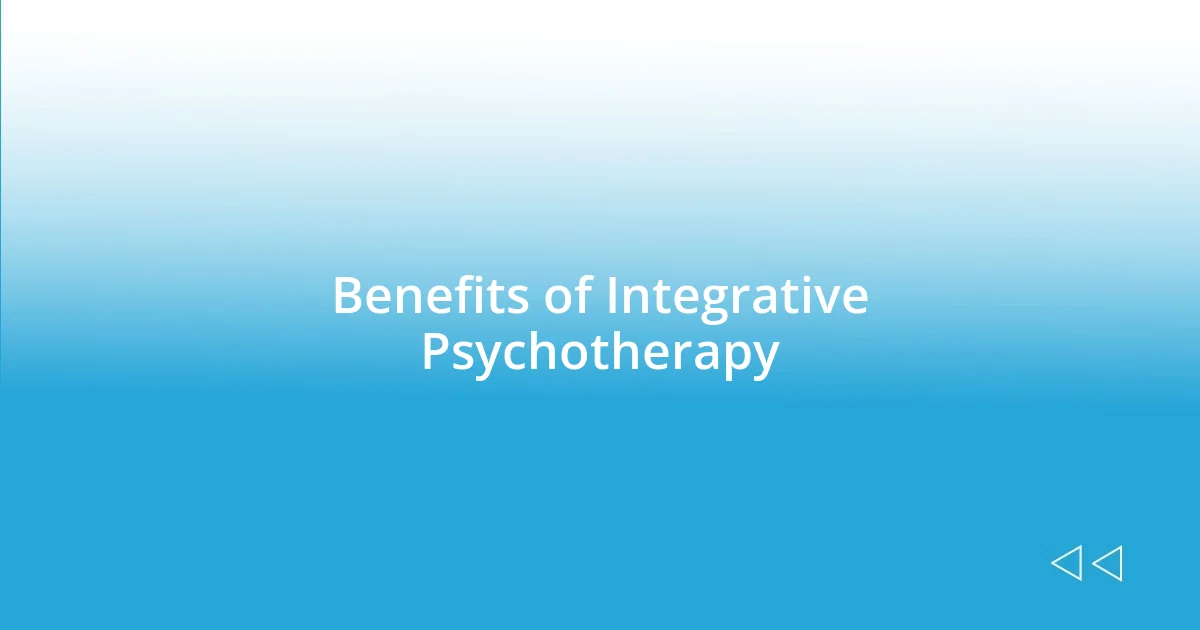
Benefits of Integrative Psychotherapy
The flexibility that comes with integrative psychotherapy was transformative for me. There were times when specific techniques resonated with my needs more than others. For instance, when I was feeling particularly overwhelmed, my therapist integrated mindfulness exercises that helped ground me in the moment. It made me realize how crucial it is to tailor the approach based on what I was experiencing that day—the connection was immediate and personal.
Another enticing benefit of this method is the way it cultivates emotional resilience. I recall a moment in therapy when we shifted gears, focusing on self-compassion instead of guilt over past mistakes. By learning to be kinder to myself, I not only felt lighter but also empowered to handle future challenges. How often do we underestimate the importance of self-kindness in our healing journey? For me, adopting this mindset has made all the difference.
Integrative psychotherapy effectively addresses a wide range of issues, giving room for holistic healing. I once struggled with a mix of anxiety and relationship issues, which felt like a tangled ball of yarn. My therapist’s ability to weave together various approaches—cognitive strategies for anxiety and relational techniques for my personal connections—allowed me to tackle both problems without feeling overwhelmed. That synergy felt almost magical, like watching a skilled artist working effortlessly with diverse colors to create a nuanced masterpiece.
| Benefit | Description |
|---|---|
| Flexibility | Therapeutic methods tailored to individual needs |
| Emotional Resilience | Fosters self-kindness and coping strategies |
| Holistic Approach | Adds depth by addressing multiple issues simultaneously |
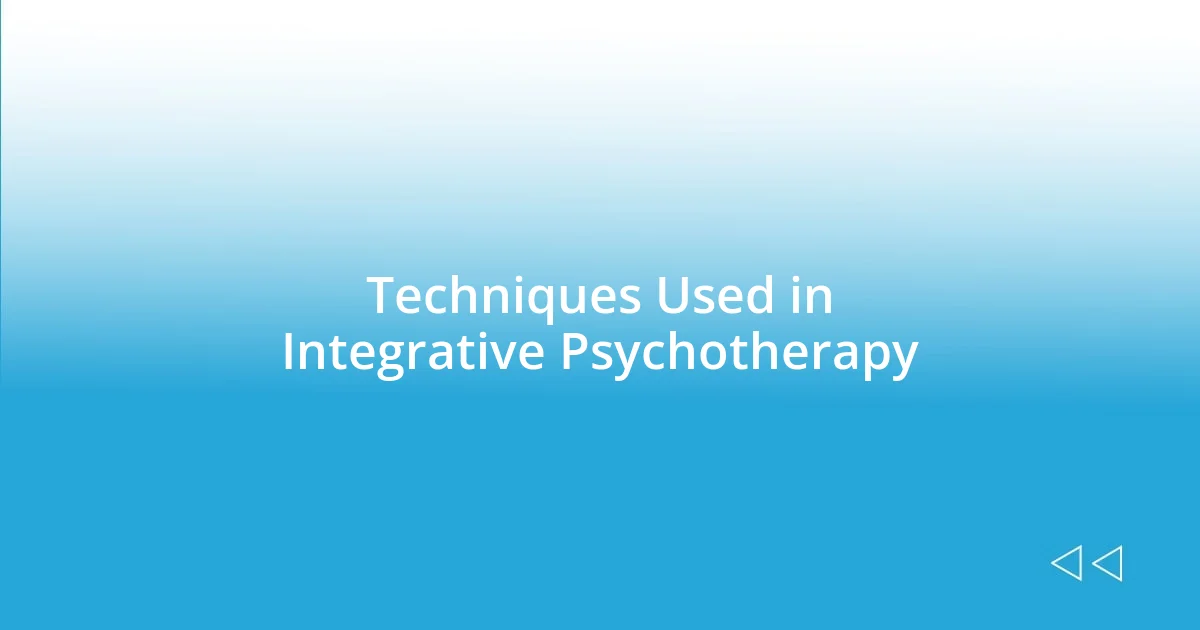
Techniques Used in Integrative Psychotherapy
Integrative psychotherapy employs a diverse range of techniques that weave together various therapeutic philosophies. One approach I found particularly effective was the combination of narrative therapy and cognitive-behavioral methods. I vividly remember discussing how the stories I told myself about my past shaped my current challenges. Working through these narratives helped me reframe my beliefs and ultimately changed how I approached daily life.
Here are some common techniques used in integrative psychotherapy:
- Mindfulness-based practices: These techniques encouraged me to be present and aware, creating a safe space to explore feelings without judgment.
- Cognitive restructuring: This technique involved challenging negative thoughts, which was eye-opening as I realized how often I was my own harshest critic.
- Emotion-focused therapy: I learned to connect with my emotions on a deeper level, which enhanced my understanding of my triggers and responses.
Each technique felt like a stepping stone in my journey, and I appreciated how they collectively contributed to my growth.
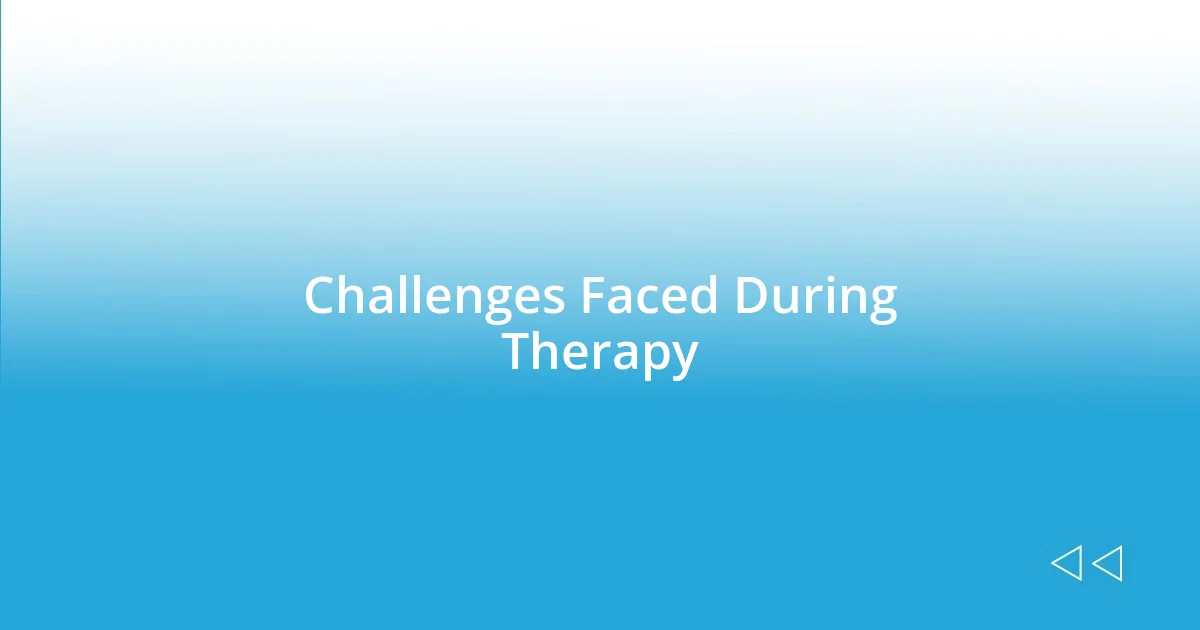
Challenges Faced During Therapy
Facing challenges during therapy can be an unexpected journey. I vividly remember the initial discomfort of opening up to someone about my deepest fears. I often wondered if my feelings were valid or if I was just exaggerating. That uncertainty sometimes felt paralyzing, making it challenging to engage fully in the process. Have you ever felt that way? I certainly did.
As my sessions progressed, I noticed that resistance often crept in unnoticed. Whether it was avoidance of tough subjects or a desire to please my therapist, I had to confront these patterns. It became clear that my mind was trying to protect me from discomfort, but this avoidance only prolonged the healing process. I’ve learned this is a common experience; we all have moments when we’d rather not face the raw truths of our emotions.
Another hurdle was finding the right balance between vulnerability and self-protection. I struggled to trust my therapist at first. It wasn’t just about sharing personal stories; it involved relinquishing control over my narrative. That tug-of-war between opening up and staying guarded taught me a lot about myself. It made me appreciate the courage it takes to be truly vulnerable—something I realized is essential in fostering any meaningful change. Have you ever faced a similar struggle? I found embracing that vulnerability to be uncomfortable yet ultimately liberating.
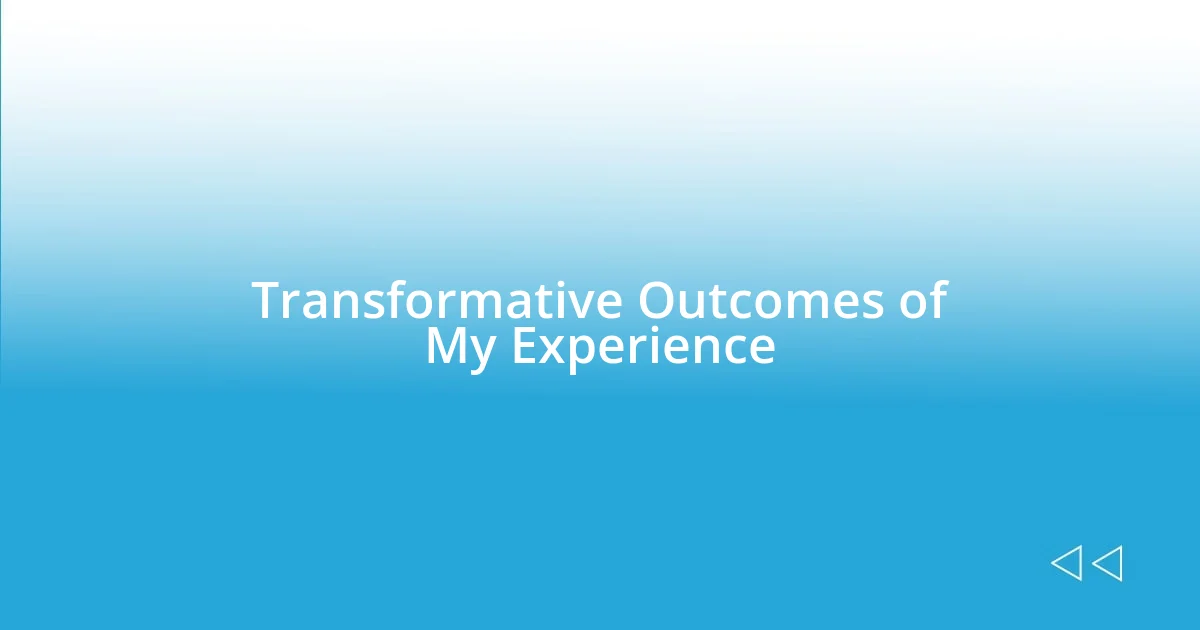
Transformative Outcomes of My Experience
The transformative outcomes of my experience with integrative psychotherapy were profound. I often found myself reflecting on moments when I suddenly felt a weight lift off my shoulders, as if I was shedding emotional baggage I had carried for years. For instance, during one session, I had an epiphany about a long-standing belief that I wasn’t worthy of love. Recognizing this untrue narrative allowed me to build healthier relationships. How liberating it felt to finally challenge that belief!
Another significant shift happened in my emotional awareness. I distinctly remember the first time I fully recognized my anger as a valid emotion. In past situations, I would either suppress it or lash out uncontrollably. But through emotion-focused therapy, I learned to sit with that anger—acknowledging it without judgment. This practice not only helped me communicate my feelings effectively but also brought a sense of peace I hadn’t expected. Have you ever discovered a hidden layer of your emotions?
The clarity I gained about my triggers was also transformative. Before I embarked on this journey, I often reacted impulsively, unaware of what was beneath the surface. Then, a crucial moment in therapy led to a breakthrough when I recognized that my anxiety was tied to childhood experiences. Understanding this connection allowed me to cultivate compassion for myself, fostering resilience in the face of challenges. Isn’t it fascinating how digging deep into our past can illuminate our present?


